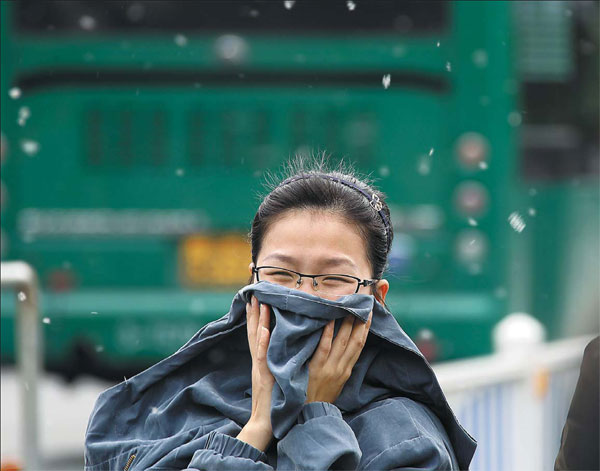Allergic to the world
Updated: 2013-05-15 05:31
By Liu Zhihua (China Daily)
|
||||||||
|
Spring is one of the worst seasons for allergy sufferers, because so much pollen is in the air. Provided to China Daily |
The change of seasons may be delightful to many, but for people who suffer skin allergies, dust and pollen can agitate conditions that make life unpleasant. Liu Zhihua reports.
The change of the weather to spring and summer is usually a delightful time, as trees turn green and flowers bloom.
But for people suffering from skin allergies, the change of seasons can be difficult, with recurring symptoms being agitated, such as skin dryness, redness, itching, swelling and sometimes blisters.
Although there are no national statistics on the prevalence of skin allergies in China, there are rising rates of skin allergies in the United States and other developed countries.
China is also experiencing an increase of skin allergy patients, experts say.
"The number of skin allergy patients in China is on the rise, and urban people tend to be more likely to suffer from the disorders than rural residents," says Liu Lingling, a skin disease specialist with No 1 Hospital of Peking University.
When she started working 30 years ago, skin allergy patients were seldom seen in hospitals, but now skin allergies prompt 50 to 60 percent of visits to skin disease doctors in small hospitals and 30 to 40 percent in big ones, Liu says.
The disorders break out when a person's immune system reacts to normally harmless substances that the body ingests or comes into contact with. Symptoms include eczema and hives.
The allergies are usually mild, despite causing discomfort, but can also be life threatening if they result in a sharp drop in blood pressure, Liu notes.
"Spring and autumn are the most prevalent time for skin allergies, when allergens such as pollen from catkins, seeds, pet hairs and waste are in the air," says Song Peihua, a skin disease specialist with China-Japan Friendship Hospital in Beijing.
Song says skin allergy patients make up the majority of her patients.

Li Tianhua, 27, a Shanghai resident, had redness and swelling in the skin around her eyes in April, and was bewildered when doctors told her she had skin allergies.
Her family has no history of allergies, and she had never before suffered from allergies - or so she thought.
Then Li remembered that in recent years she occasionally suffered from rashes if she walked past trees in bloom.
"I thought I had never been allergic and would never be," Li says. "I was wrong."
She later noticed that a number of her friends and colleagues were suffering skin allergies this spring, even those who had never been allergic before.
The mechanism of skin allergies is complicated, but modern lifestyles definitely contribute to the disorders, says Liu, the skin disease specialist.
There are many chemical products used in daily life, which may contain potential allergens.
Some experts believe increasing hygiene, which eliminates microbes that would otherwise help people develop defenses against bacteria and viruses, contribute to allergies, including skin allergies.
Air pollution and a growing number of pets in an industrialized society will also bring about more allergens, adds Song, the skin disease specialist.
Wendy Loh, 35, a Singaporean who has been living in Beijing for a decade, has had skin allergies since she was 13. The problem occurs in all seasons, especially in dry or extreme weather, during transitional seasons, or when she's under pressure.
Sometimes the allergies are so bad that people will ask her if she has been burned or suffers from domestic violence.
"There are so many unexpected allergens, and sometimes I wish I lived in a bubble to avoid them," Loh says.
Mi Mi, 28, from Beijing, is pregnant with twins. She has long suffered from allergies.
She blames both her genetics and Beijing's worsening water and air for her suffering.
"I remember the air in Beijing used to be good, not so dry and polluted," Mi says.
"As I grew older, the living environment in Beijing worsened, and my allergies became worse with it."
Mi suffered from itchy localized rashes on her limbs when she was a young child. As time passed by, her problem has worsened.
During primary school, the rashes spread all over her body except for her head and neck, with her legs most severely affected.
Sometimes, the rashes would develop into blisters and broke, causing pain and scarring.
Now, her list of allergens is long, and her allergic reaction is not limited to skin conditions. It is very troubling, but there are no efficient solutions.
Even steroid cream is out of the question, because she is afraid of endangering her babies.
Both Loh and Mi hope their children will not suffer as they do.
Experts say while the risk of allergies can be influenced by genetics - with young children with allergic parents the most at risk - many people who have no family history can develop allergies and others with a long family history can be fine.
For a person with a family history of allergies, if he or she is healthy enough they are unlikely to develop allergies.
But if a person is under great pressure or has other risk factors that result in disordered immunity, allergens will tend to trigger any underlying disorders more easily, explains Song.
"The most important thing is to keep the body in good condition through a healthy diet, rest and exercise, and deal with pressure positively," Song says.
If a person does develop skin allergies, seeking help from a doctor is always wiser than using steroid cream.
Contact the writer at liuzhihua@chinadaily.com.cn.
(China Daily 05/15/2013 page19)

 Michelle lays roses at site along Berlin Wall
Michelle lays roses at site along Berlin Wall
 Historic space lecture in Tiangong-1 commences
Historic space lecture in Tiangong-1 commences
 'Sopranos' Star James Gandolfini dead at 51
'Sopranos' Star James Gandolfini dead at 51
 UN: Number of refugees hits 18-year high
UN: Number of refugees hits 18-year high
 Slide: Jet exercises from aircraft carrier
Slide: Jet exercises from aircraft carrier
 Talks establish fishery hotline
Talks establish fishery hotline
 Foreign buyers eye Chinese drones
Foreign buyers eye Chinese drones
 UN chief hails China's peacekeepers
UN chief hails China's peacekeepers
Most Viewed
Editor's Picks

|

|

|

|

|

|
Today's Top News
Shenzhou X astronaut gives lecture today
US told to reassess duties on Chinese paper
Chinese seek greater share of satellite market
Russia rejects Obama's nuke cut proposal
US immigration bill sees Senate breakthrough
Brazilian cities revoke fare hikes
Moody's warns on China's local govt debt
Air quality in major cities drops in May
US Weekly

|

|








